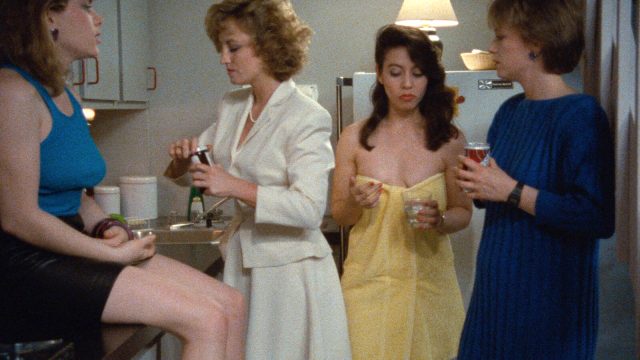Lizzie Borden’s sharp, funny, and frank Working Girls is a great testament to the value of independent film. This kind of tart, sympathetic-but-unsentimental take on the sex work as work, sort of like Clerks set in an upper-middle-class brothel, is not the kind of thing big studios would ever give us.
Louise Smith stars as Molly, a lesbian photographer who–unbeknownst to her live-in girlfriend, Diane, and their daughter–works a few shifts a week in an apartment in Manhattan, catering to men’s variously banal, vulnerable, odd, and troubling fantasies. Her clients are–as customers in any service industry tend to be–varied. Some are matter-of-fact and considerate, separating Molly-the-woman from Molly-the-professional but being casually friendly with both; others are rude or insulting; still others are sweet-natured but, perhaps, a little fuzzy on the exact nature of what they’re buying, the kind of guys who shyly hope the barista is flirting with them. Some want fantasies, others want a feeling of connection. (Desire isn’t actually a huge part of the movie, but what’s here is human and well-handled.)
Working Girls excels at capturing the feeling of a meandering, too-long workday. Molly’s boss, passive-aggressive madam Lucy (Ellen McElduff), pressures her into working a double-shift; a habitual looky-loo comes in to make awkward conversation with the women before remembering, as always, that he’s “forgotten to feed the meter”; the workers fudge their time-sheets to make more money under the table, without Lucy taking a cut. Coworkers air their resentments about the boss, who eventually turns up to offer a whirlwind of criticism and greed. No one wants to play receptionist. There’s even an office birthday party, complete with cake.
One of the best and most universally relatable parts of Working Girls is how irregular shift assignments make Molly’s comfort at work oscillate wildly, with her even fluidly–and without much comment on Borden’s part–moving in and out of the closet as the day goes on. She’s open about Diane to the laid-back Gina (Marusia Zach), who’s on the precipice between coworker and actual friend, but a new hire’s squeamishness about a requested girl-on-girl scene leads to a very different response. Smith does a fantastic job keeping a straight–pun intended–and slightly brittle expression on her face when one man explains that Molly is so different from most women in her line of work, who are such stereotypes: all those bisexuals!
This is an unusual, well-observed workplace comedy, smart and sympathetic about its “working girl” characters and unapologetically pro-labor and anti-management. We cheer for Molly finally, decisively clocking out at the end of the night, but I’d like to also cheer for Gina organizing some kind of union. Maybe someday.
Working Girls is streaming on HBO Max and the Criterion Channel.

